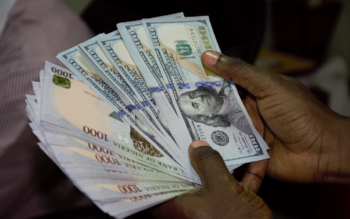
PricewaterhouseCoopers Limited says the naira may exchange at N386 in the second half of 2018.
In its 2018 economic outlook released on Tuesday, PwC said lowered oil prices, disruptions to crude oil productions and political instability are the major near-term risks to economic stability.
“In H2’18, we estimate a 7% exchange rate depreciation in the I&E window to N386/USD, as FX demand increases and foreign investments slow ahead of the 2019 elections,” PwC said.
“Overall, the CBN maintains its multiple exchange rate regime, sustaining its intervention in the various FX markets.
“We expect revenues to underperform budget by 34% as a shortfall in non-oil revenues offsets the impact of the strong recovery in oil revenues.
“Consequently, debt service to revenue expands to 45%, higher than the projected 31% in the budget.
“Fiscal deficit widens by 67% to N3.4 trillion (2.4% of GDP). We expect that the deficit will be funded by an increased issuance in the domestic bond market.”
In 2017, the federal government, through the Debt Management Office, issued various types of debt instruments like the Sukuk, FGN Savings bond and Eurobonds in addition to treasury bills.
As of September 2017, the nation’s debt had risen to N20 trillion.
In 2017, the monetary policy committee of the Central Bank of Nigeria maintained monetary policy rate to keep inflation in check.
The committee, which is responsible for reviewing the CBN monetary policy framework and adopting changes where necessary, was unable to meet in January because the senate refused to approve members appointed to replace retired members of the committee.